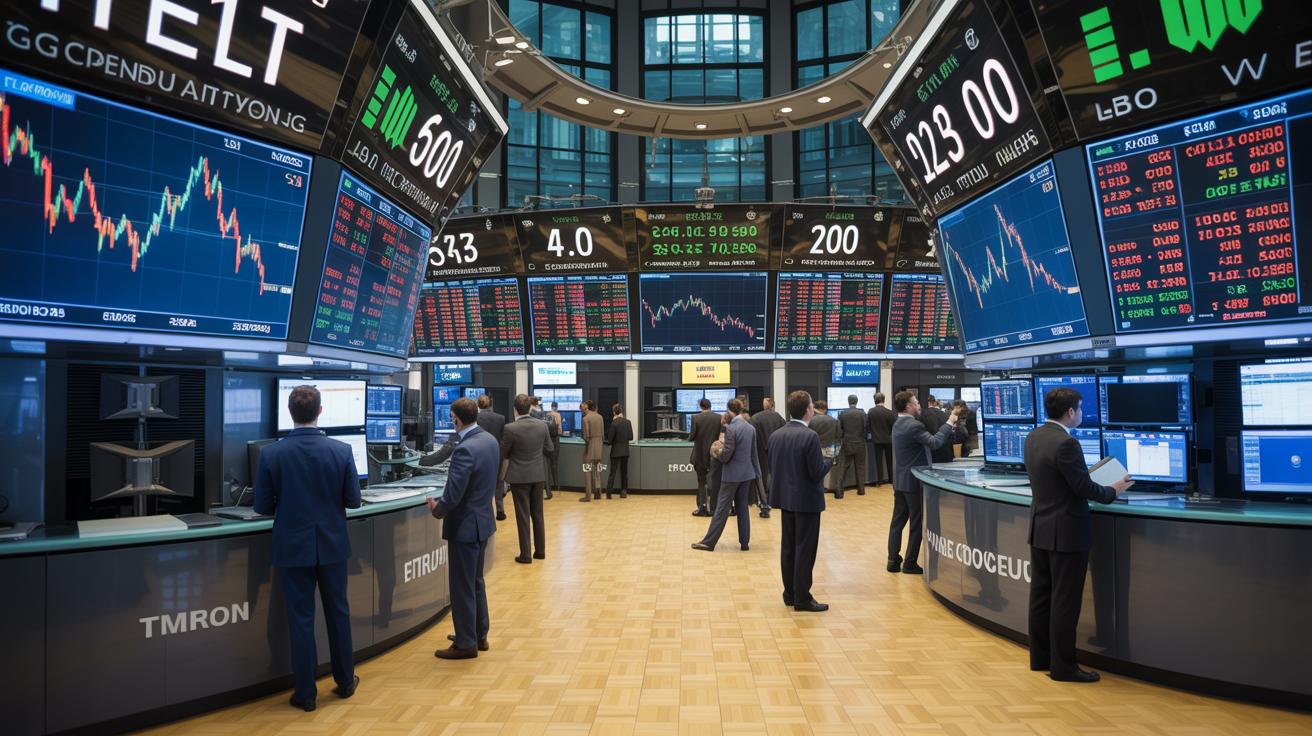What You Need to Know
- 📉 UK Economic Contraction: The UK economy shrank by 0.3% in April, exceeding economist expectations of a 0.1% decrease, with declines in services and production sectors contributing to the downturn.
- 📦 Record Export Plunge: UK exports to the U.S. fell by a staggering £2 billion ($2.71 billion) in April, marking the largest monthly drop since 1997, primarily due to new tariffs.
- 📉 European Stock Markets Drop: The Stoxx 600 index opened lower, with the travel sector down 1.5%, reflecting broader concerns about economic stability across Europe.
- 📊 Tariffs as a Major Concern: A survey reveals that 63% of institutional investors see trade levies as the most significant macroeconomic risk impacting their strategies.
- 🔍 Trade Tensions Impact: Investor confidence falters amid ongoing U.S.-China trade talks, as mixed signals from leaders contribute to market volatility.
The European markets have been navigating through turbulent waters as multiple economic indicators signal potential downturns. Recent data highlights a contraction in the UK economy, steep declines in exports to the U.S., and fluctuating European stock indices. These developments resonate with investors globally, especially given the interconnected nature of today’s financial markets. As we delve deeper into the implications of these economic shifts, it’s crucial to understand their potential long-term impacts on the global economy and individual businesses.
UK Economy Contracts Amid Weak Economic Data
The latest reports from the UK reveal a worrying trend: the economy contracted by 0.3% in April. This downturn is more severe than economists had anticipated, as they were expecting only a 0.1% decrease. The contraction follows modest growth in the preceding months, with a 0.2% rise in March and a 0.5% increase in February. The Office for National Statistics attributes this decline to downturns in the services and production sectors. These sectors are vital for the UK’s economic stability, and their struggles could signal more profound systemic issues.
Finance Minister Rachel Reeves described the GDP figures as “clearly disappointing.” The government’s revised spending review aims to address these challenges by investing more in housing and transport. However, with the looming threat of further interest rate cuts and cooling wage growth, the economic outlook remains uncertain. As the government rolls out its “Plan for Change,” the effectiveness of these measures will be critical in determining whether the UK can navigate these economic headwinds.
Record Drop in UK Exports to the U.S.
The UK faced a record-breaking decline in goods exports to the U.S. in April, with a drop of £2 billion ($2.71 billion). This decrease is unprecedented and marks the largest monthly fall since 1997. The decline is largely attributed to the implementation of tariffs on goods imported to the United States, which have made British products more expensive and less competitive in the U.S. market. As a result, the trade deficit has widened, exacerbating economic challenges.
The ongoing trade tensions between the UK and the U.S. have overshadowed potential benefits from the recently announced trade deal. Although the agreement outlines future cooperation, it still imposes a 10% blanket tariff on British goods and maintains 25% duties on key exports like steel, aluminum, and autos. These tariffs have become a significant macroeconomic concern, as evidenced by a survey showing that nearly two-thirds of institutional investors view trade levies as the main threat to their strategies.
European Stock Markets Open Lower
European stock markets have opened to a bleak landscape, with the Stoxx 600 index falling by 0.42% and almost all sectors experiencing declines. The travel sector, in particular, is in the red, down by 1.5%. This downturn reflects the broader uncertainties plaguing the European economy, from weak economic data in the UK to ongoing global trade tensions. These indicators suggest a lack of investor confidence, as many anticipate potential policy changes and economic adjustments.
The opening calls for major European indices further illustrate this volatility. London’s FTSE is projected to open 33 points lower, Germany’s DAX down by 189 points, France’s CAC 40 by 44 points, and Italy’s FTSE MIB by 282 points. These declines underscore the interconnected nature of European markets, where economic shifts in one country can have ripple effects across the region. As investors watch these developments closely, the focus will be on how policymakers respond to stabilize and restore confidence in the markets.
Tariffs: The Dominant Macroeconomic Concern
In the current economic climate, tariffs have emerged as the dominant macroeconomic concern for investors worldwide. A recent survey by British investment manager Schroders highlights that 63% of institutional investors and wealth managers identify trade levies as the most significant risk to their strategies. This concern stems from ongoing trade disputes, particularly between major economies like the U.S. and China, which have had far-reaching implications for global trade dynamics.
The uncertainty surrounding trade negotiations and tariff implementations has led to hesitancy among investors. The recent faltering confidence in U.S.-China trade talks exemplifies this, as mixed messages from leaders and policy ambiguities create confusion in the markets. As investors navigate these complexities, the broader question remains: how will global trade policies evolve to address these challenges, and what strategies will investors need to adopt in response?
As the European markets grapple with these multifaceted challenges, the global economic landscape remains unpredictable. The interplay between trade policies, economic data, and market reactions will continue to shape the outlook for investors and policymakers alike. With the UK government’s “Plan for Change” underway and trade tensions still unresolved, the path forward is fraught with uncertainty. How will these economic dynamics influence future growth prospects, and what measures can be taken to ensure stability in an increasingly volatile world?
Did you like it?4.6/5 (30)







7 comments
isaiah3
With exports dropping like that, should the UK be looking more towards Asia for new trade deals?
jane
Cheers for the article! It’s crucial for businesses to adapt quickly to these changing conditions.
Levi7
Yikes, that’s quite a nosedive. Wondering how the government plans to tackle this situation effectively?
Tiger
Are there any silver linings or opportunities for the UK amidst this economic turmoil?
Ian
Oh dear, seems like Brexit was just the beginning of our troubles! What’s next, a tea shortage? 😅
Isabella
Thanks for the detailed analysis. It’s concerning to see how tariffs can have such a massive impact on trade.
Leah
Wow, this is intense! Do you think this marks the beginning of a major economic crisis in the UK? 🤔